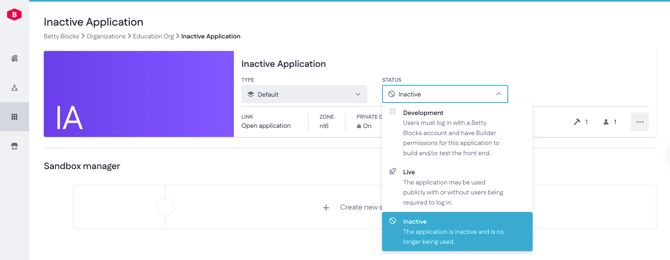Application types & statuses
This article clarifies the types and statuses your Betty Blocks applications may have.
After reading this article you’ll know:
-
The difference between the default, playground, and training application types
-
What statuses your applications can have and what they mean
-
When the trial organization is created
Betty Blocks provides a system of application types and statuses that helps developers and organizations streamline their app creation process. In this article, we will explore the different application types and statuses offered by Betty Blocks and their significance in the development landscape.
Betty Blocks applications can be separated into three different types. These types can have one or several statuses. This is the list of different types of applications with the status that they can have:
- Default
- Live
- Development
- Inactive
- Playground
- Training
- Disabled
Default
Default is the standard application type in Betty Blocks. It serves as the foundation for application development and is the only type that can be promoted to a production/live application. The default type can have three statuses: live, development, and inactive.

Within an organization, you can have unlimited default applications. When a default application has the status development, Private Data Mode (PDM) is turned on. When the status is live, PDM is turned off, allowing external users to use the application. The default type combined with the live status is also the only combination in which PDM is disabled. To set the application live, you need to have an active contract with Betty Blocks.

When your default application is in development status, we’ll reach out to find out when you plan to release it.
It’s important to note that an application cannot be created directly as a default with the live status. The promotion to the live status must always be done after creation. This promotion can only be executed by an application’s organization admin and is contingent on the organization being linked to an active contract or customer.
Playground
A playground application in Betty Blocks serves as a safe and versatile environment for prototyping, testing, and validating applications without immediate impact on licensing. Each license comes with a case-by-case limit of playground apps per customer/contract.

For customers, this means they can:
-
Share these playground apps within their company without worrying about unexpected licensing increases based on the applications component.
-
Ensure that developers or individuals working on these apps cannot disclose the application and its data to the public without going through an organization admin.
The playground application type provides a flexible and risk-free space for experimenting with app ideas before committing them to a live production environment.
Training
Training applications are designed for specific training purposes. Like playground applications, these always have PDM turned on by default, but they are not limited in the numbers that can be created. However, training applications can only be created by Betty Blocks support.
Training apps are distinct because they are inherently suited for training or trial purposes and maintain strict data management controls.
Disabled
The disabled status is rather self-explanatory: it means your application was disabled by Betty Blocks because the contract has ended or the application is no longer used. If your application has this status and you want it enabled again, please, contact our support team.
Note: Make sure to have an active contract before reaching out to the support.
Inactive
If your application has not been updated in the past 30 days and its status is not set to live, it will automatically transition to inactive.
Trial organization
A trial organization is an organization within Betty Blocks that is not linked to an active contract or customer. This type of organization is typically created when a user signs up for a Betty Blocks account. When users sign up for a trial, a new customer is generated in our system, accompanied by one organization. The organization has a checkbox indicating whether it is a trial customer or not.
When a user is invited to join another organization or application connected to a different customer, they are assigned roles and permissions based on the contract of that specific customer.
Overall, Betty Blocks offers a comprehensive system of application types and statuses to meet various development needs. From the standard default applications to the risk-free playgrounds and purpose-specific training applications - these categories help users manage and organize their app development process efficiently. Trial organizations are strictly used for training purposes and they can never be set to live.
